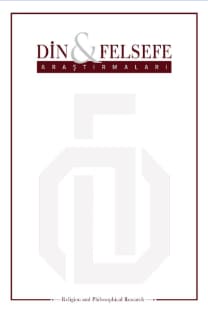Liber XXIV Philosophorum (Yirmi Dört Filozofun Kitabı): On İkinci Yüzyıldan Hermetik Bir Metin
24 Filozofun Kitabı, Orta Çağ Felsefesi, Teoloji, Hermetizm, Yeni Platonculuk
Liber XXIV Philosophorum (Book of the 24 Philosophers): A Hermetic Text from the Twelfth Century
The Book of the Twenty-Four Philosophers, Medieval Philosophy, Theology, Hermeticism, Neo-Platonism.,
___
- Baeumker, Clemens. “Das pseudo-hermetische 'Buch der vierundzwanzig Meister' (Liber XXIV philosophorum)”. Studien und Charakteristiken zur Geschichte der Philosophie, insbesondere des Mittelalters. Gesammelte Vorträge und Aufsätze. ed. Clemens Baeumker vd. 194-214. Münster: Freiburg im Breisgau, 1927.
- Carabine, Deirdre. The Unknown God Negative Theology in the Platonic Tradition: Plato to Eriugena. Louvain: Peeters Press, 1995.
- Ebeling, Florian. The Secret History of Hermes Trimegistus – Hermeticism from Ancient to Modern Times. München: Cornell University Press, 2005.
- Eriugena, John Scotus. Periphyseion (De Divisione Naturae) Liber Tertius. Dublin: Institute for Advances Studies, 1981.
- Flasch, Kurt. Was ist Gott? Das Buch der 24 Philosophen. München: Verlag C.H. Beck, 2011.
- Harries, Karsten. “The Infinite Sphere: Comments on the History of a Metaphor”. Journal of the History of Philosophy 13/1 (1975), 5-15.
- Hudry, Françoise. Le Livre des XXIV Philosophes (Latin text and French translation). Grenoble: Millon, 1989. Kefeer, Michael. “The World Turned Inside Out: Revolutions of the Infinite Sphere from Hermes to Pascal”. Renaissance and Reformation 12 (1988), 303-313.
- Lucentini, Paolo. “Il Liber Viginti Quattuor Philosophorum Nei Poemi Medievali: il Roman de la Rose, il Granum Sinapis, la Divina Commedia”. Poetry & Philosophy in the Middle Ages. ed. John Marenbon. 133-131. Leiden: Brill, 2001.
- McGinn, Bernard. The Harvest of Mysticism in Medieval Germany. New York: A Herder & Herder Book, 2005. Özalp, Hasan. “Tanrı Hakkında Konuşa(ma)mak: Plotinus’da Negatif Teoloji”. Turkish Studies 10/2 (2015), 737-748. Philo. De Calogo (On the Decalouge). Cambridge: Harvard University Press, 1958.
- Philo. The Works of Philo Judaeus, the Contemporary of Josephus. London: George Bell & Sons, 1890.
- Plotinus. Enneads Volume IV Loeb Classical Library. Cambridge: Harvard University Press, 1984.
- Porreca, David. “How Hidden Was God?”. Histories of the Hidden God. ed. April D. DeConick vd. 137-148. New York: Routledge, 2014.
- Ruh, Kurt. Geschichte der abendländischen Mystik. München: Beck, 1996.
- Sannino, Antonella. “Berthold of Moosburg’s Hermetic Sources”. The Journal of the Warburg and Courtauld Institutes 63 (2000), 243-248.
- Yayın Aralığı: Yılda 2 Sayı
- Başlangıç: 2018
- Yayıncı: Din Felsefesi Derneği
Alaa Al-Din Arafat, Egypt in Crisis: The Fall of Islamism and Prospects of Democratization
İrfan A. Khan’ın Kuran Hermenötiğine Bir Giriş
Liber XXIV Philosophorum (Yirmi Dört Filozofun Kitabı): On İkinci Yüzyıldan Hermetik Bir Metin
Fenomenolojik Din Felsefesi Nedir?
Hume’un Algılar Demeti Kuramı ve Zihin Felsefesi Tartışmalarına Etkisi
Evren Kendi Kendine Ortaya Çıkmış Olabilir mi?
İmam Mâtürîdî’nin Ahlâk Düşüncesinde Ahlakın Kaynağı Olarak İnsan Tabiatı
